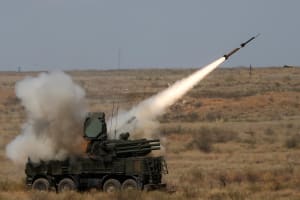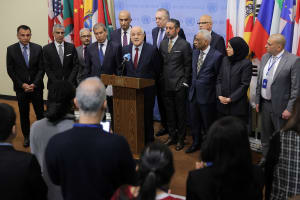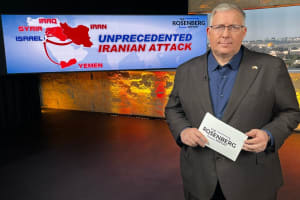Here’s the inside story of how an Israeli prime minister made the incredibly risky decision to destroy Syria’s secret nuclear reactor, risking all-out war and the wrath of Washington
My conversation for ALL ISRAEL NEWS with the only living Israeli leader to ever take out a foreign nuclear program
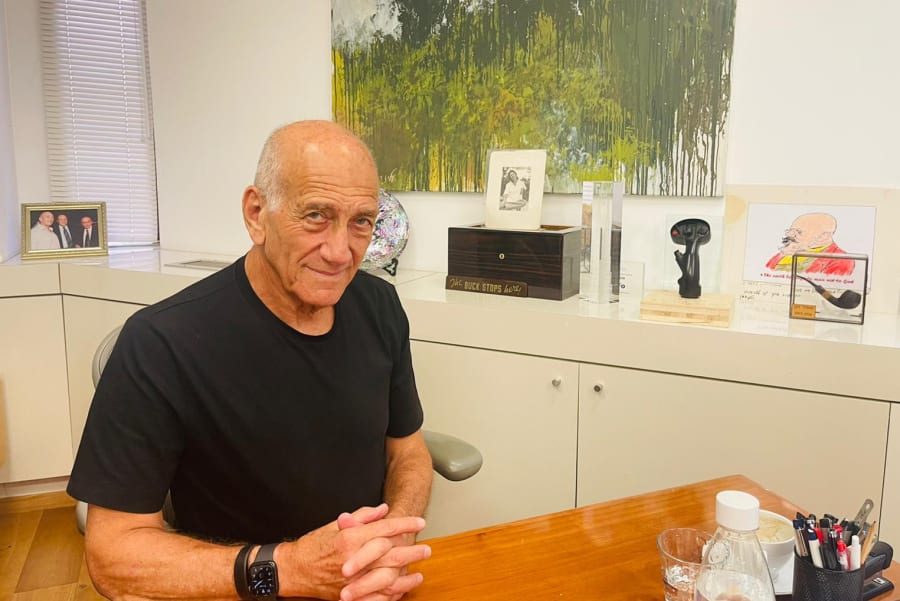
JERUSALEM—With Iran only five days away from having enough highly-enriched fuel to begin building an arsenal of nuclear bombs, and the nuclear talks in Vienna seemingly going nowhere, Israeli officials are actively considering a pre-emptive military strike as the only way to neutralize Tehran’s nuclear threat.
The risks to Israel are enormous – a strike could unleash a massive regional war.
But the risk of inaction is also enormous.
No Israeli prime minister can allow the Iranian regime to build The Bomb, and threaten the Jewish state with a “Second Holocaust.”
There is only one country on earth that has ever used military force to destroy an enemy nation’s nuclear program.
Israel.
And they have done it twice.
The first time was almost 40 years ago – on June 7, 1981.
That was the day Israeli Prime Minister Menachem Begin ordered “Operation Opera” in which his air force would bomb Iraqi President Saddam Hussein’s nuclear reactor in a section of Iraq known as Osirik.
It was risky move. Washington was furious. But the gamble paid off. Iraq’s nuclear weapons program was utterly destroyed and has never been successfully re-started.
The second time was almost 15 years ago – on Sept. 6, 2007.
That was the day Israeli Prime Minister Ehud Olmert ordered “Operation Orchard” in which his air force would bomb Syrian President Bashar al-Assad’s top secret nuclear reactor in a section of Syria known as Deir Ezzor.
This, too, was a risky move.
Here’s why.
THE DAY WASHINGTON SAID “NO”
On March 1, 2007, Olmert’s top intelligence advisors told him of a suspicious facility in Syria that they feared might be a nuclear reactor and thus could eventually allow the Syrians to build nuclear weapons.
For the next five months, Olmert ordered the Mossad to gather everything they could on the shadowy facility.
He even approved an operation in which Israeli spies would snatch the laptop of Syria’s chief nuclear engineer during meetings in Vienna, break into the computer, and copy every piece of information on the hard drive.
It worked.
Now dead certain Assad was going nuclear – and that the reactor would go “hot” in just a few months – Olmert asked U.S. President George W. Bush to bomb the reactor.
For all of the massive intelligence gathering assets of the United States, and for all of Bush’s public statements about preventing radical regimes from building or acquiring nuclear weapons, how had the U.S. missed the fact that the North Koreans were building a nuclear reactor in Syria in the first place?
Bush’s Defense Secretary Robert Gates would later concede in his 2014 memoir, “Duty,” that “this was a significant failure on the part of U.S. intelligence agencies.” (p. 171 of the Kindle edition)
Olmert made the case directly to Bush that doing so would not only send a strong message to Assad that illegal nuclear activity – unsanctioned by the international community – would not be tolerated, but that the Iranian regime would get the message, too.
But after weighing all the factors – including the fact that he was immersed in two simultaneous wars in Afghanistan and Iraq – Bush said no.
Now what?
A HIGHLY CONTROVERSIAL FIGURE
I sat down with Olmert in his Tel Aviv office almost a year ago to ask him on-the-record how he made the enormously risky decision to defy the United States – Israel’s most important ally – and take the Syrian matter into his own hands.
Now, as we approach the 15-year anniversary of Olmert’s gamble – and as current Israeli leaders weigh the risks of their own pre-emptive military strike against Iran’s nuclear facilities – ALL ISRAEL NEWS is ready to publish the full transcript of our conversation.
First, it is important to note that Olmert has long been a highly controversial figure in Israeli politics and society for a number of reasons.
For one, many Israelis believe Olmert all-but-lost the Second Lebanon War against Iranian-backed Hezbollah in the summer of 2006, badly damaging Israel’s reputation, and causing his approval rating in Israel to drop as low as 17%.
For another, in 2008 Olmert presented Palestinian leader Mahmoud Abbas the most sweeping and generous offer of a Palestinian state – including the division of Jerusalem – ever made by any Israeli prime minister. Abbas rejected the offer, but the terms of the offer itself were highly unpopular throughout Israel. People argued Olmert was trying to give away far too much, far too fast, and to a Palestinian leadership that couldn’t be trusted.
For still another, Olmert was convicted by an Israeli court of accepting illegal contributions to his political campaign when he had been the mayor of Jerusalem. He served 16 months in prison but was released early in July 2017 for good behavior.
“During my time I made mistakes, although in my opinion they weren’t criminal, and today I pay a hefty price,” Olmert said at the time, adding that “no man is above the law.”
That said, the decision by Olmert to order air strikes against the Syrian nuclear reactor – risking all-out war and the wrath of Washington – is the most important of his career.
The fascinating inside story is the stuff of political thrillers – the very kind I love to write – yet this is not fiction.
It’s all true.
And worth reading carefully, and in full.
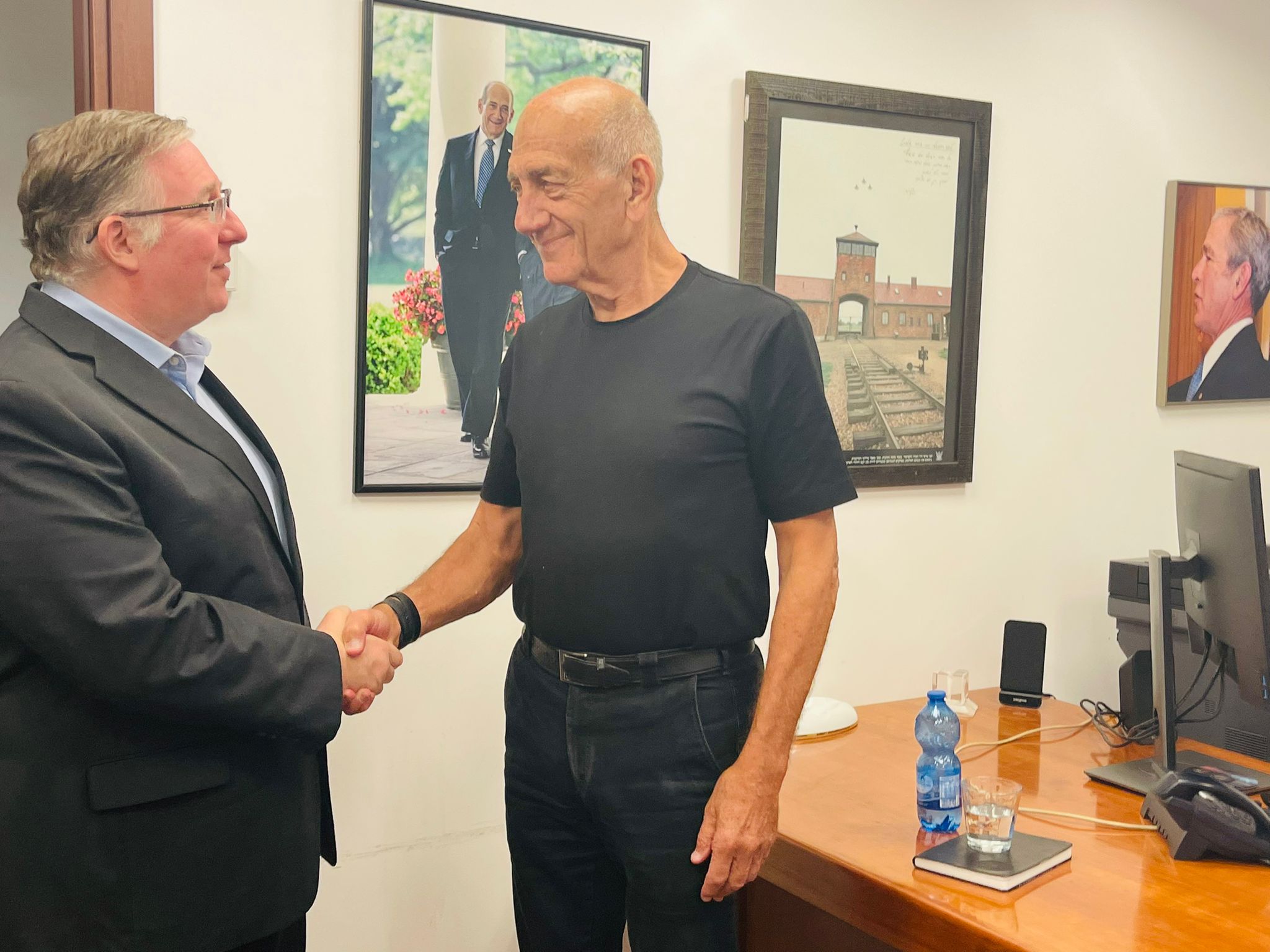
Here, then, is one portion of our conversation, lightly edited for clarity.
JOEL ROSENBERG: You are the only living Israeli prime minister who has gone through the process of making the decision – and you made it – to take out a foreign nuclear reactor.
How did you get to that point to make that decision?
To an outsider, it might theoretically seem simple. You found a suspicious facility in Syria. You suspected it might be a nuclear reactor. You ordered [Mossad chief] Meir Dagan to have his people break into the Syrian nuclear chief’s laptop in Vienna. You decided it had to be destroyed before coming online. You asked the Americans to take it out. They wouldn’t.
I mean, this was a series of very dangerous decisions.
I'd like to have people hear your assessment of how you got there.
FORMER PRIME MINISTER EHUD OLMERT: Look, first of all, I would like to address myself to the specifics of what you asked and then say something in general about my attitude [at the time.]
When I was prime minister, I was privy, obviously, to every bit of information and intelligence that we had.
And I insisted on getting – not the summaries that are prepared on the based on thousands of independent pieces of news and intelligence that eventually would come to the table of one of the analysts, who writes a summary that is brought to the attention of the prime minister.
But you see, I don’t want to see the summaries – summaries I can do myself, maybe not better, but not worse, than some 24- or 25-year-old analyst who sits in the Intelligence Department who reads all raw material. I want to read the raw materials. So, I read thousands of pieces of news and [intelligence] reports every week in order to really be able to understand, to feel, what's going on, which I thought was very important.
Now, one of the things we felt we understood from the information that we had, the intelligence, was that the Syrians were talking, were hinting at something that could be interpreted as nuclear. And we started to be curious. I mean, what the heck are they doing with a nuclear facility?
And that's when I directed the head of [military] intelligence, the head of Mossad, the heads of all the different intelligence bodies to pick up everything they could, to focus on every possible [option] in order to find out whether or not Syria was really involved in [building a] nuclear [plant that could lead them towards nuclear weapons].
And when the opportunity arose, I commissioned them to look into the files of the guy who was at that time the head of the nuclear program of Syria.
ROSENBERG: He was in Vienna at the time?
OLMERT: Yes, Vienna.
ROSENBERG: That's when they grabbed his laptop and cracked into the laptop, and it was a treasure trove?
OLMERT: They came back, and they showed me the pictures [that were on the nuclear chief’s laptop] and became absolutely evident that they have nuclear power….
We took satellite photos, but it was very difficult because the facility was already covered….
So, we had to find other ways [to confirm that it was nuclear reactor].
[NOTE: Olmert described to me hand-picking six Israeli intelligence operatives and sending them deep into Syria to secretly investigate and come back with proof.]
After a week, they came back with a written report, signed by each one of them, and they unanimously thought that this was a reactor of a specific type. And they recommended that it be destroyed as soon as possible.
Now I don’t want to go into all the details here. I wrote them in my book.
[NOTE: Several years ago, Olmert published his memoirs in Hebrew. In March, the English edition was released.]
The critical point, what occupied my thoughts in my mind, was the major difference between this event and the decision that Menachem Begin took in took in 1981 to destroy the atomic reactor in Iraq.
For whatever reason, the Syrian government got information, intelligence information [in the summer of 2007] that America and Israel are planning to attack Iran and Syria in the autumn of 2007.
[They believed that] America will attack Iran to destroy all of their nuclear installations, and Israel will destroy Syria as a follow up to the Second Lebanon war.
This was a wrong intelligence. But the Syrians [heard this somehow, believed it, and] decided that they can't ignore it.
So, as a result, they have prepared all of their missile arsenal to be activated in the event that Syria will be attacked by Israel.
Sometime during the summer, they pulled out from their tunnels all the launchers of the long-range missiles, and they put all their missiles on the launchers. And we [suddenly] had their list of targets – their target bank – that they have prepared.
Each target was one of the strategic places in Israel. Their missiles were targeted to our oil refineries….All of our military bases in Israel from north to south to the center of Tel Aviv to the Azrieli buildings. You name it.
Three hundred missiles – with a range that can reach every point in Israel – were ready for launching.
Now, assuming that everything else was done, researched, analyzed, discussed at length – that this is an atomic reactor [in Syria], and that this reactor is going to be activated in a matter of two or three months, that this is made only for one purpose, to build atomic bombs, and so on and so forth – the main issue that we had to deal with was: How can we attack the Syrians when all their missiles are on their launchers and within minutes after we start the attack, they will press the button and in a matter of a couple of hours, every strategic point in Israel will be attacked by long range missiles without anyone knowing anything about anything? Suddenly the whole country will be covered with missiles, and no one will know why.
ROSENBERG: And Israel's missile defense system wasn't quite as advanced as it clearly is today.
OLMERT: It was not capable at that time of blocking long-range missiles of this type.
We still don't have a system that can block them, you know, with complete absolute certainty over the skies.
So, [today], if they will shoot the 300 missiles, maybe 150 of them will land in strategic positions in Israel.
At that time, it would have taken us 96 hours to destroy Syria. But in 96 hours, they could have caused damage that would cause the death of thousands of people.
So, the dilemma was: Unlike Iraq, okay, where you just risked eight planes, here we will risk eight planes. But also, if they push the button, then all of Israel is under attack and thousands of people will die.
Now, what do we do?
Do we wait, at the risk that they will develop the atomic reactor, or do we go to war, which could be a terrible disaster?
And [the reactor] was 700 meters from the Euphrates River, which means that all along the Euphrates River, whenever someone will die, Israel will be held responsible for contaminating the entire country.
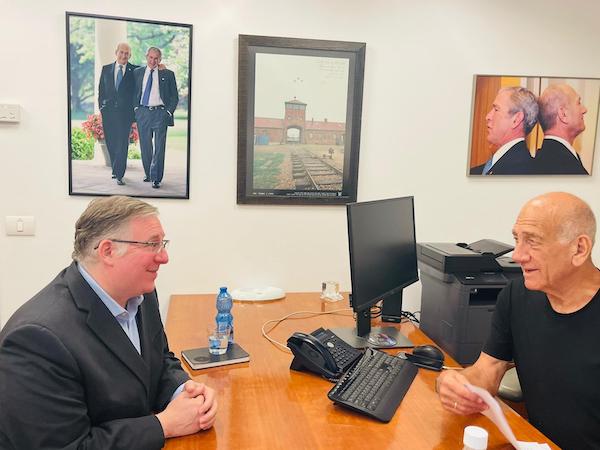
ROSENBERG: What you're describing is what a thriller writer comes up with – a worst case scenario – but you were living it.
OLMERT: Yes, and this is something that we had to do.
Now the question was: If there is to start an overall war, then why not from the beginning attack them with a complete surprise and destroy all of the missiles before they shoot them?
The premise [was] that if we just attack the atomic reactor in the northeastern of part of Syria, they will shoot the missiles, and then we will have to do it [hit their missiles], but then it will be after Israel has suffered already the first wave of attack.
On the other hand, if Israel will start – out of nowhere – a comprehensive attack on Syria, this will devastate the entire world, which will say, “What the heck happened to you guys? Why did you attack all of Syria? Is it because you think that you are not successful enough in the Second War in Lebanon, and now you want this? I mean, you’re crazy, you’re irresponsible, you’re reckless, how can one count on you?”
And so on and so forth.
On the other hand, if we don't do it, then maybe we have thousands of casualties.
And also, how do we prepare for a possible comprehensive war without no one noticing that we are doing it, in order not to give the Syrians a hint about what we planned because they already feel that we are planning a war against them?
So, if they will notice that we are making some movements in Israel, they'll say, “Hey, they are actually going to attack us.”
So, not only will they shoot at Israel after the Israeli attack, they will shoot at Israel in a preventive measure. So, it will be even worse.
So, these were the kind of dilemmas that we had to deal with.
[NOTE: It was at this point in his war planning with his advisors that Olmert decided to ask the Americans to destroy the reactor, instead of Israel.]
I had an idea that I would ask America to destroy the atomic reactor.
Now, the reason I thought about it was not because I had any doubt whatsoever – even for one second – that Israel can do it itself. We could do it just as good, perhaps even better – the Israeli Air Force – than the American Air Force. There's no question about it.
The point was that while I was dealing with the Syrians, I had in mind the Iranians.
I was aware of the fact that the Iranians were not taking that seriously the warnings and the threats coming from Israel and also from America. “Hey, guys, you better watch it. Don't start with nuclear [weapons] because we will destroy it.”
If America, not Israel, will destroy the atomic reactor in Syria and make a formal public announcement, “We did it because we promised that we will not allow any non-democratic government in any part of the world to build atomic weapons – we did it to Syria because this is our commitment,” then I said to [Vice President] Dick Cheney and to [President] George W. Bush, like good friends, “Once you do this, you actually hit two birds with one stone.”
1. You will destroy the atomic reactor in Syria.
2. At the same time, you will frighten the Iranians to the degree that the next day they will sit with you in an entirely different way.
Now, that’s why I proposed it to George Bush.
Dick Cheney was entirely on my side.
But [Defense Secretary] Bob Gates was against it entirely.
And he was a voice for many in the administration to say that, “Olmert is dragging Bush into another conflict in the Middle East.”
He had enough [of war in the region]. He felt we shouldn't do it.
And Gates, as he writes in his book, “Duty,” came to George Bush and told him, “Listen, you [need to] warn Olmert not only that we [the United States] will not do it [take out the Syrian reactor], but if Olmert will not do it, and if he will ignore your advice [then] you have to stop the special relationship with Israel.”
That's what he says. That's what he wrote in his book that he said to the president.
[NOTE: I have read Gates’ book, and this is exactly what Gates writes of his advice to Bush. See page 175 of the Kindle edition.]
So, President Bush told me [on July 13, 2007] that America can't do it.
And he advised me that we [Israel] shouldn't do it, and that [instead] there would be a diplomatic effort.
[NOTE: In his 2010 memoirs, “Decision Points,” Bush recalled that he told Olmert, “I cannot justify an attack against a sovereign nation unless my intelligence agencies stand up and say it’s a weapons program.” Bush then wrote, “I told him I had decided on the diplomatic option backed by the threat of force.” See page 421 of the Kindle edition.]
What I said to the president was, “President Bush, I entirely respect your decision that America will not do it. But the ultimate responsibility for the existence of Israel and its security lies on my shoulders, not yours.”
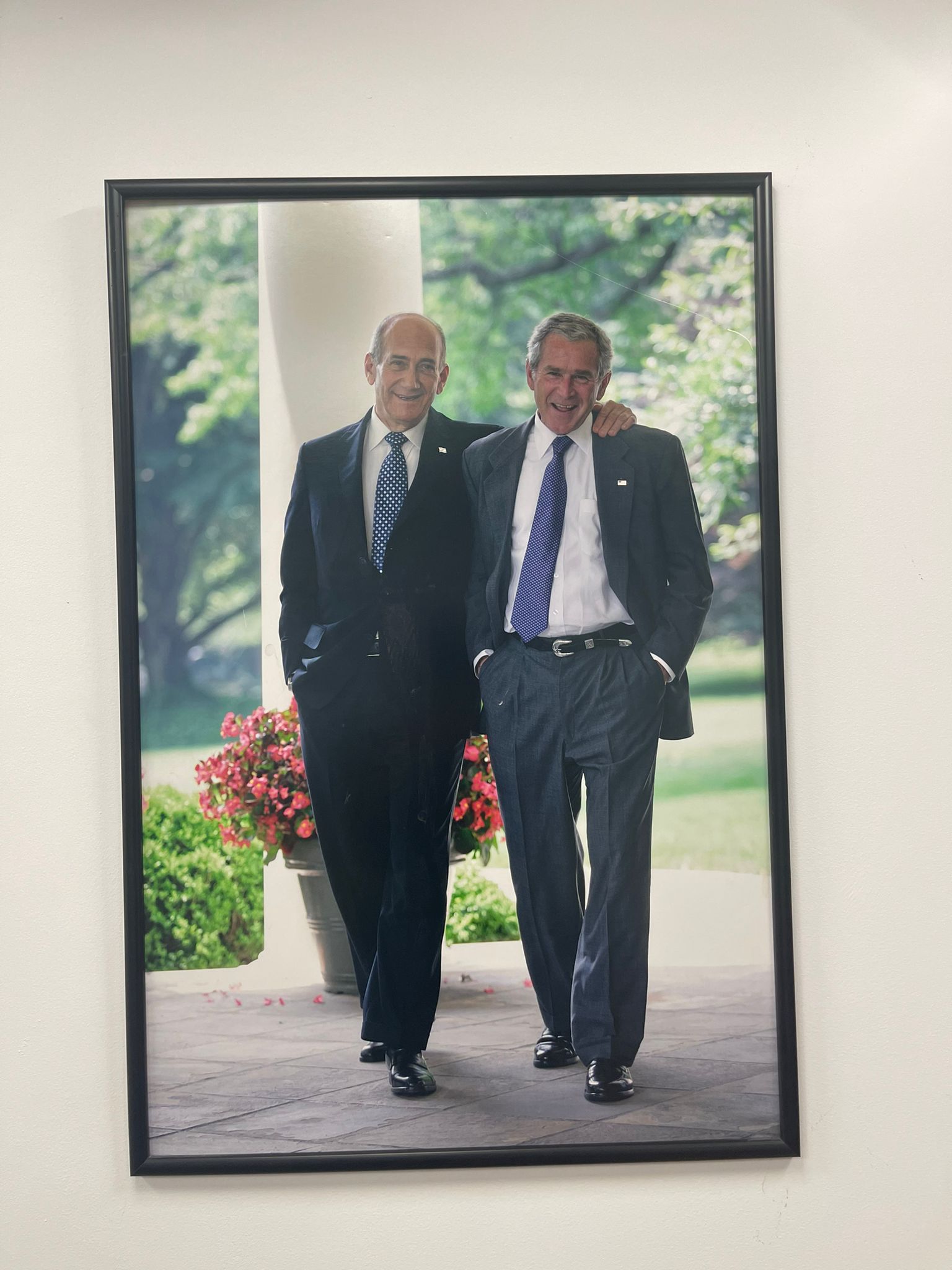
ROSENBERG: One thing I think it's important for our readers to note is that you were making some comparisons between [Prime Minister Menachem] Begin and yourself and the different situations you each faced. But one of the other differences which is big is that Begin didn't tell [President Ronald] Reagan [that he was going to bomb the Iraqi nuclear reactor in Osirik]. And Reagan was very upset.
OLMERT: Yes.
ROSENBERG: You decided because of the relationship [with the U.S.] that they needed to at least know [about the existence of the reactor and the threat to Israel and the region], so they could make their own decisions, right?
OLMERT: Normally, the [American] president wouldn’t want me to share with him ahead of time [if Israel was going to attack an Arab country].
I never shared with him [that I was going to do it].
I did other things, which subsequently were recognized and praised by the president and vice president and the head of the CIA, and the chairman of the Joint Chiefs of staff.
But I didn’t share in advance with the president, knowing that he wouldn't do it [agree with Olmert’s course of action].
But this was something unprecedented in the immediate context between Israel and Syria, but also in the broader picture given the fact that we were talking about Iran day in, and day out.
So, considering the Iranian threat, I thought it was worthwhile talking with the president about this [Syria nuclear threat] and trying to get America to be more actively involved.
ROSENBERG: I think you were right about that.
OLMERT: But he [Bush] turned me down.
[NOTE: Defense Secretary Gates writes that he was “furious” with Olmert when he learned that Bush had promised Olmert not to make the existence of the Syrian reactor public. This, Gates, realized, was a signal that Israel was going to attack, not allow the U.S. to confront the Assad regime at the United Nations and give Assad a diplomatic ultimatum.]
I understood [Bush’s dilemma].
The only question [for me at that point] was how to handle this delicate situation – how to attack [Syria], and make sure they don’t attack.
ROSENBERG: Why did the Syrians not retaliate?
OLMERT: They didn't retaliate because they knew that at the end of the day, we would destroy Syria.
It would have caused us pain – it would have cost us – but we would have destroyed Syria.
Had the Syrians used their missiles, in 96 hours – or 72 – there would be no Syria.
I mean, no government.
We would not have killed all the people there.
But we have destroyed the army, destroyed the installations, destroyed the strategic positions, destroyed their bases, destroyed almost everything which was of any value.
And I think they knew it.
And also [they didn’t retaliate] because we were smart. We didn't say a word.
Now you have to understand that the knowledge in Syria that they had built a nuclear reactor was limited to five people. The president [Bashar al Assad], [Brigadier General] Muhammad Suleiman – the head of the shadow army of Syria [who was allegedly assassinated by Israeli commandos one year later] – and a couple of more. They were the only ones in Syria that knew that somewhere remotely in the northeast part of Syria, they are building an atomic reactor.
ROSENBERG: So, you guys were thinking that if you strike and don't say anything, nobody in Syria knows the reactor was there, and so there was a plausible deniability, they can decide it didn't happen.
OLMERT: The reactor was distant from any major urban center where people were living. It was hidden. It was in the bottom of a big valley. The nearest road where cars were driving by were a few hundred meters away. So, no one could see that in the bottom of this valley – wadi – that there is an atomic reactor being built.
And also, once they built it with a roof, you know, it's a huge building…but no one could see what's inside. So, somehow, they could get away with it.
Now, the fact that we didn't say anything allowed them to say on that first evening, when the minister of defense of Syria called the president and he said to the president, “I heard that Israeli planes were attacking some place in the northeast part of our country. I mean, what is it?”
So, Assad said to him, “They’re idiots. They have attacked a deserted factory that is of no use. And we shot back at them, and they were flying away.”
He didn't say anything about the atomic reactor.
So, by then it became obvious that they are not going to retaliate and they're not going to shoot the missiles.
ROSENBERG: Thank God. Wow.
OLMERT: President Bush was in Australia on that day.
We called the Situation Room, and my people say to them, “The prime minister needs to speak to the president urgently.”
They say the president is in Australia.
Then they came back to us and say, “The president is not near a secure line. So, he suggested that he will call you in an hour.”
And we said, “Fine.”
And then the president called.
Now, I didn't know how to say [this sensitive news] to the president, even though he was on a secure line, but you never know.
I want to be very careful.
So, I started by schmoozing him. I say to the president, “How are you? How is Australia? How is Sydney? You know. I love Sydney. Sydney is great.”
And he said, “Hey, Prime Minister, I mean, like, what the heck are talking about? Why did you call me in the middle of nowhere?”
And, you know, it’s five o'clock in the morning, Israeli time. Maybe four o’clock in the morning, Israeli time.
So, I said, “Mr. President, I just wanted to share with you – remember, we had something in the north.”
I didn't say what.
He said, “Yes.”
“Well, I just wanted you to know that it doesn't exist anymore.”
And he said, “Oh, that's very fine. Very fine.”
And then he said, “May I ask a question?”
Which shows you what a great friend he was.
I said, “Sure you can ask me.”
He said, “Do you anticipate any reaction?”
Which was the main theme that concerned all of us.
I said, “Mr. President, as of now – which is three hours after the explosion – we don't see any sign that something is going to take place.”
So, he said, “I just want you to know, Prime Minister, that if there will be a response, then you should know that all of the United States of America has your back.”
And I say, “Thank you, Mr. President.”
And then we hung up and I say to my staff, “I think now I can take a rest.”
[NOTE: Once the dust cleared, and a bit more time passed, it became clear to the Bush administration that Syria was not going to retaliate, President Bush called Olmert on a secure line from the White House far more enthusiastic and told Olmert that he had done the right thing. Then, in April 2008, the U.S. publicly released its own intelligence to the world to show that Assad really had been working with North Korea to build an illegal nuclear reactor on Syrian soil.]
[NOTE: Years later, Vice President Cheney publicly praised Olmert’s decision as “a remarkable story of courage, determination, and Israeli military might.” Cheney called the close cooperation between the U.S. and Israel “a blueprint for how countries can and should act when faced with a threat of an existential nature.”]
[NOTE: In his memoirs, “Decision Points,” President George W. Bush also lauded the gutsy, high-risk decision. “Prime Minister Olmert’s execution of the strike made up for the confidence I had lost in the Israelis during the Lebanon War….The bombing demonstrated Israel’s willingness to act alone. Prime Minister Olmert hadn’t asked for a green light, and I hadn’t given one. He had done what he believed was necessary to protect Israel.” See page 422 of the Kindle edition.]
ROSENBERG: I want to say thank you.
I want to say thank you as an American.
But I also want to say thank you as an Israeli – with kids who served [in the IDF].
It’s not a small thing.
It’s not a small thing.
And I know you have taken a lot of heat for a lot of things, but this is one of the great things you have done.

Joel C. Rosenberg is the editor-in-chief of ALL ISRAEL NEWS and ALL ARAB NEWS and the President and CEO of Near East Media. A New York Times best-selling author, Middle East analyst, and Evangelical leader, he lives in Jerusalem with his wife and sons.



